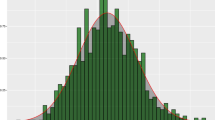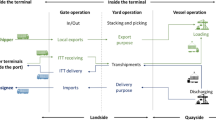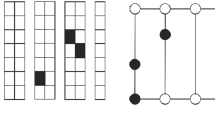Abstract
Traditional revenue management relies on long and stable historical data and predictable demand patterns. However, meeting those requirements is not always possible. Many industries face demand volatility on an ongoing basis, an example would be air cargo which has much shorter booking horizon with highly variable batch arrivals. Even for passenger airlines where revenue management (RM) is well-established, reacting to external shocks is a well-known challenge that requires user monitoring and manual intervention. Moreover, traditional RM comes with strict data requirements including historical bookings (or transactions) and pricing (or availability) even in the absence of any bookings, spanning multiple years. For companies that have not established a practice in RM, that type of extensive data is usually not available. We present a data-driven approach to RM which eliminates the need for demand forecasting and optimization techniques. We develop a methodology to generate bid prices using historical booking data only. Our approach is an ex-post greedy heuristic to estimate proxies for marginal opportunity costs as a function of remaining capacity and time-to-departure solely based on historical booking data. We utilize a neural network algorithm to project bid price estimations into the future. We conduct an extensive simulation study where we measure our methodology’s performance compared to that of an optimally generated bid price using dynamic programming (DP) and compare results in terms of both revenue and load factor. We also extend our simulations to measure performance of both data-driven and DP generated bid prices under the presence of demand misspecification. Our results show that our data-driven methodology stays near a theoretical optimum (< 1% revenue gap) for a wide-range of settings, whereas DP deviates more significantly from the optimal as the magnitude of misspecification is increased. This highlights the robustness of our data-driven approach.










Similar content being viewed by others
Data Availability
Not Applicable.
References
Akan, M., and B. Ata. 2009. Bid-Price Controls for Network Revenue Management: Martingale Characterization of Optimal Bid Prices. Mathematics of Operations Research 34 (4): 912–936.
Ata, B., and M. Akan. 2015. On Bid-Price Controls for Network Revenue Management. Stochastic Systems 5 (2): 268–323.
Ball, M.O., and M. Queyranne. 2009. Toward Robust Revenue Management: Competitive Analysis of Online Booking. Operations Research 57 (4): 950–963.
Ban, G.Y., and C. Rudin. 2018. The Big Data Newsvendor: Practical Insights from Machine Learning. Operations Research 67 (1): 90–108.
Belobaba, P.P. 1987. Air Travel Demand and Airline Seat Inventory Management. PhD Dissertation. Massachusetts Institute of Technology.
Belobaba, P.P. 1989. Application of a Probabilistic Decision Model to Airline Seat Inventory Control. Operations Research 37 (2): 183–197.
Bergstra, J., D. Yamins, and D.D. Cox. 2013. Making a Science of Model Search: Hyperparameter Optimizationin Hundreds of Dimensions for Vision Architectures. JMLR Workshop and Conference Proceedings, 28 (1), pp. 115–123. Atlanta.
Bertsimas, D., and P. Vayanos. 2015. Data-Driven Learning in Dynamic Pricing Using Adaptive Optimization. Submitted to Mathematical Programming, 1-45.
Boyd, E.A., and R. Kallesen. 2004. Practice Papers: The Science of Revenue Management When Passengers Purchase the lowest Available Fare. Journal of Revenue and Pricing Management 3: 171–177.
Chen, Y., and V.F. Farias. 2013. Simple Policies for Dynamic Pricing with Imperfect Forecasts. Operations Research 61 (3): 612–624.
Gallego, G., and G. Van Ryzin. 1994. Optimal Dynamic Pricing of Inventories with Stochastic Demand Over Finite Horizons. Management Science 40 (8): 999–1020.
Garrow, L., and V. Lurkin. 2021. How Covid-19 is Impacting and Reshaping the Airline Industry. Journal of Revenue and Pricing Management 20: 3–9.
Garrow, L.A., V. Lurkin, and L. Marla. 2022. Airline OR Innovations Soar During COVID-19 Recovery. Operations Research Forum 3 (1): 14.
Gautam, N., S. Nayak, and S. Shebalov. 2021. Machine Learning Approach to Market Behavior Estimation with Applications in Revenue Management. Journal of Revenue and Pricing Management 20: 344–350.
Guillet, B.D., and A.M. Chi Chu. 2021. Managing Hotel Revenue Amid the COVID-19 Crisis. International Journal of Contemporary Hospitality Management 33 (2): 604–627.
Jasin, S. 2015. Performance of an LP-Based Control for Revenue Management with Unknown Demand Parameters. Operations Research 63 (4): 909–915.
Kumar, R., W. Wang, a. Simrin, S. Arunachalam, B. Guntreddy, and D. Walczak. 2021. Competitive Revenue Management Models with Loyal and Fully Flexible Customers. Journal of Revenue and Pricing Management, 256–275.
Lapp, M., and L. Weatherford. 2014. Airline Network Revenue Management: Considerations for Implementation. Journal of Revenue and Pricing Management 13: 83–112.
Liotta, N.J. 2019. Airline Revenue Management for Continuous Pricing: Class-Based and Classless Methods. Master's Thesis. Massachusetts Institute of Technology.
Ma, W. 2010. Dynamic, Data-driven Decision-making in Revenue Management. PhD Dissertation. Massachusetts Institute of Technology.
Mardan, S. 2010. Lumpy and Late: The Challenges in Air Cargo and Scientific Processes to Handle Them. Presentation at the AGIFORS Cargo Study Group Meeting. New York, USA.
McGill, J.I., and G.J. Van Ryzin. 1999. Revenue Management: Research Overview and Prospects. Transportation Science 33 (2): 233–256.
Nambiar, M., D. Simchi-Levi, and H. Wang. 2019. Dynamic Learning and Pricing with Model Misspecification. Management Science 65 (11): 4980–5000.
Ozden, A.T., and E. Celik. 2021. Analyzing the Service Quality Priorities in Cargo Transportation Before and During the Covid-19 Outbreak. Transport Policy 108: 34–46.
Perakis, G., and G. Roels. 2009. Robust Controls for Network Revenue Management. Manufacturing & Service Operations Management 12 (1): 56–76.
Phillips, R. 2015. Data-Driven and Big Data Revenue Management. Presentation at the INFORMS Revenue Management and Pricing Conference. Columbia University.
Rauch, J., K. Isler, and S. Pölt. 2018. Disentangling Capacity Control from Price Optimization. Journal of Revenue and Pricing Management 17 (1): 48–62.
Retsef, L., R.O. Roundy, and D.B. Shmoys. 2007. Provably Near-Optimal Sampling-Based Policies for Stochastic Inventory Control Models. Mathematics of Operations Research 32 (4): 821–839.
Talluri, K.T., and G.J. Van Ryzin. 1998. An Analysis of Bid-Price Controls for Network Revenue Management. Management Science 44 (11): 1577–1593.
Talluri, K.T., and G.J. Van Ryzin. 2004. The Theory and Practice of Revenue Management. New York: Springer.
Van Ryzin, G., and J. McGill. 2000. Revenue Management Without Forecasting or Optimization: An Adaptive Algorithm for Determining Airline Seat Protection Levels. Management Science 46 (6): 760–775.
Walczak, D., E.A. Boyd, and R. Cramer. 2011. Revenue Management. In Quantitative Problem Solving Methods in the Airline Industry ed. By C. Barnhart, & S. B., 101–161. New York: Springer.
Weatherford, L. 2016. The History of Forecasting Models in Revenue Management. Journal of Revenue and Pricing Management 15: 212–221.
Acknowledgements
The authors thank Michael Wu for his editing and feedback that led to considerable improvements in the presentation of this paper.
Author information
Authors and Affiliations
Corresponding author
Additional information
Publisher's Note
Springer Nature remains neutral with regard to jurisdictional claims in published maps and institutional affiliations.
Appendices
Appendix 1: Optimal price under exponential demand assumption
Continuing from “DP generated bid price” section, as an illustrative example, under exponentially distributed WTP, the purchase probability at a price, \(P_{w} \left( {p,t} \right)\), is given by
where the mean willingness-to-pay is given by \(\alpha \left( t \right)\). From the DP formulation in Eq. (2), the optimal price equation is given by
Therefore, under the exponential demand assumption given by Eq. (4), this turns into
In this case, generation of \(b\left( {x,t} \right)\) and \(p^{*} \left( {x,t} \right)\) both require the estimation of the demand model parameters \(\lambda \left( t \right), \alpha \left( t \right),\) and \(p_{0} \left( t \right).\)
Appendix 2: Numerical example for relation of data-driven approach to EMSR
Let us look at an example comparing EMSR results to those of the data-driven approach with no consideration of booking times and using a simple average for estimation.
Let us denote the total demand for fare class 1 by \(D_{1}\) and assume it is normally distributed, \(D_{1} \sim N\left( {3,2} \right),\) with a fare of \(f_{1} = 400.\) The corresponding EMSRs for class 1 calculated by \(f_{1} P\left( {D_{1} > s} \right)\) for each remaining capacity \(s = \left\{ {1, \ldots ,10} \right\}\) as described in “Expected marginal seat revenue (EMSR)” section are provided in Table 2.
Let us now look into our data-driven methodology under the same assumptions. Sampling from \(D\sim N\left( {3,2} \right)\) to represent 5 flights (departure dates), applying Algorithm 1 to pad with zeroes for any surplus capacity, and then using average for estimation of bid price \(b^{DD} \left( {x,t} \right)\) yield results in Table 3. Results based on 100 samples are also provided in the same table.
As seen by the results, \(b^{DD} \left( {x,t} \right)\) approach EMSR values as the sample size increases.
Rights and permissions
Springer Nature or its licensor (e.g. a society or other partner) holds exclusive rights to this article under a publishing agreement with the author(s) or other rightsholder(s); author self-archiving of the accepted manuscript version of this article is solely governed by the terms of such publishing agreement and applicable law.
About this article
Cite this article
Eren, E.C., Zhang, Z., Rauch, J. et al. Revenue management without demand forecasting: a data-driven approach for bid price generation. J Revenue Pricing Manag (2024). https://doi.org/10.1057/s41272-023-00465-3
Received:
Accepted:
Published:
DOI: https://doi.org/10.1057/s41272-023-00465-3




